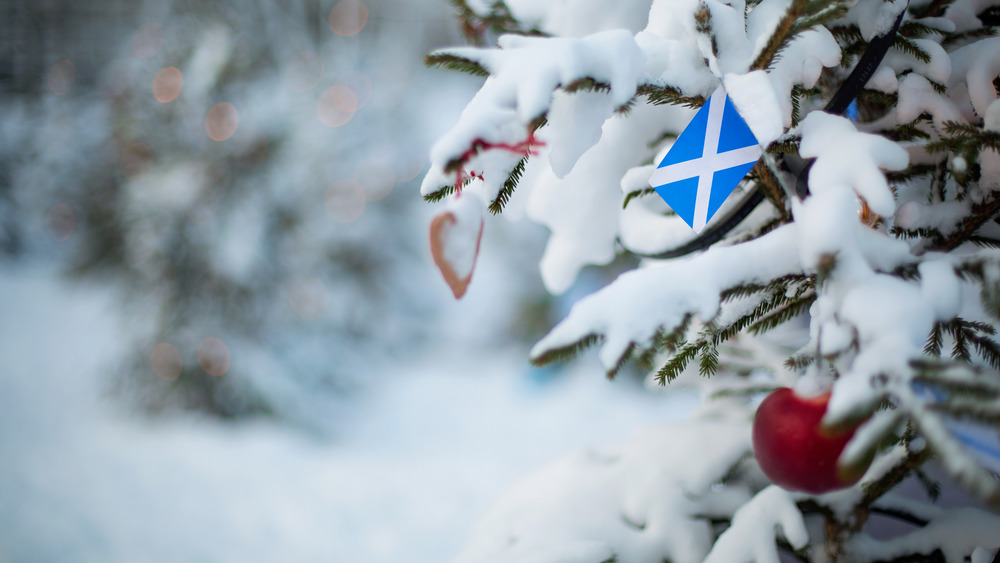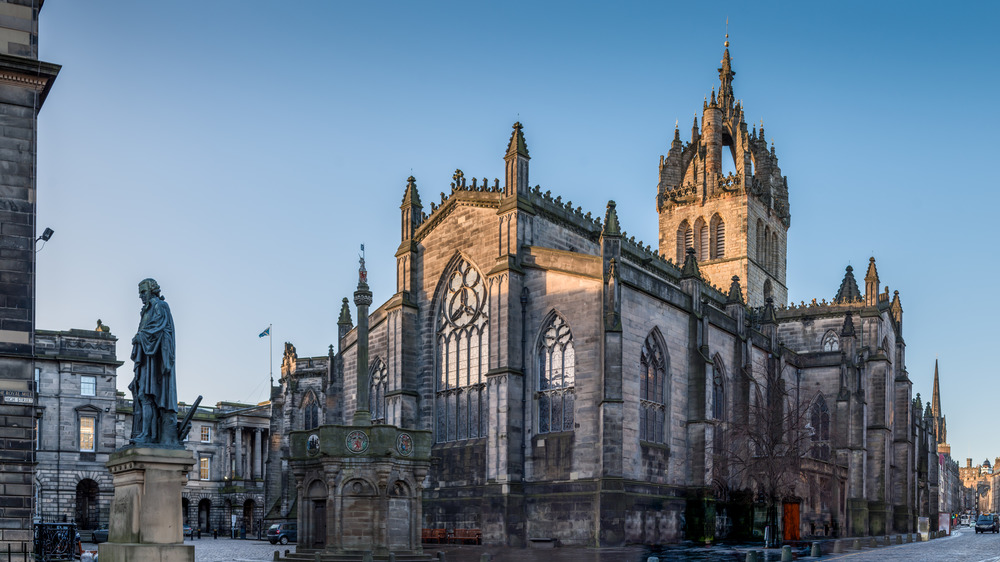This Is Why Scotland Banned Christmas For 400 Years
While those of us in the 21st century may think of the so-called "war on Christmas" as a relatively new idea, the holiday actually has a history of vehement opposition that dates back centuries. The New York Times reported in 2016 that the accusations that liberals have something against Christmas gained traction among Christian conservatives after Fox News ballyhooed a 2005 book titled The War on Christmas: How the Liberal Plot to Ban the Sacred Christian Holiday Is Worse Than You Thought. The president writing "Happy Holidays" instead of "Merry Christmas," however, is nothing compared to what the celebration has seen in the past.
Take, for example, what Scotland did to Christmas for centuries. Although Christmas is so popular among 21st century Scots that many just assume it has always been celebrated in their country, Edinburgh Live tells us that's not exactly the case. It actually didn't become a public holiday in Scotland until 1958. "It seems almost incredible, ask most Scots today they simply won't believe you," said history professor Bill Naphy. "It has become a holiday so quickly and so embedded in the consciousness that not only have people forgotten that it was outlawed they can't even believe that it was outlawed." With the holiday right around the corner, let's take a look at how this Christian country went 400 years without officially celebrating the birth of Jesus Christ.
The Church of Scotland banned Christmas
The origins of the prohibition of Christmas in Scotland date back to the Protestant Reformation in the 16th century. Led by the minister John Knox, the country followed the trend begun by Martin Luther in 1517 and officially split from the Catholic Church in 1560, and traditions like Christmas began to be viewed by the new Protestant Church of Scotland as extravagant celebrations that misinterpreted the teachings of the Bible. The church suspended all Christmas celebrations, but Scots weren't really on board. Christmas is fun, and they didn't like being told they couldn't enjoy it anymore. The Scottish authorities encountered such resistance to the suspension of Christmas that the Parliament went so far as to make celebrating it illegal in 1640. It became a crime to observe the "Yule vacations," and the law was indeed enforced. That's right: People were actually put in jail for celebrating Christmas in 17th-century Scotland. How's that for a war on Christmas?
According to Parliament records, another "Act discharging the Yule vacance" was passed in 1690, claiming that the holiday "hath been a great interruptione to the course of justice in this kingdome." So people didn't get the day off. Everyone had to work on Christmas Day and wait until Hogmanay, on New Year's Eve, to party. The obvious real injustice is banning Christmas, and the laws didn't last. They were ultimately repealed at the beginning of the 18th century.
Christmas was still unofficially banned in Scotland for centuries
You try telling people you've cancelled Christmas and see how it goes. The move ended up being as unpopular as you'd expect, and there were those who voiced their opposition to the Yuletide prohibition. According to The Scotsman, one English clergyman was recorded as having some tough words for the party poopers: "The ministers of Scotland, in contempt of the holy-day observed by England, cause their wives and servants to spin in open sight of the people upon Yule day, and their affectionate auditors constrain their servants to yoke their plough on Yule day, in contempt of Christ's nativity. Which our Lord has not left unpunished, for their oxen ran wild, and break their necks and lamed some ploughmen, which is notoriously known in some parts of Scotland."
Although the Scottish Parliament revoked the ban on Christmas in 1712, the Church still frowned upon the holiday for centuries, and most people wouldn't so much as hang a wreath in their homes until the 1940s. Therefore, many Scottish Christmas traditions are actually imported from the U.K. and the United States. According to the National Trust for Scotland, however, some of the original Scottish traditions still survive. Luckily, working on Christmas is no longer a custom there, but many people still bake a traditional unleavened Yule bread for their families. If you find a trinket in your slice, you'll have good luck in the coming year.


